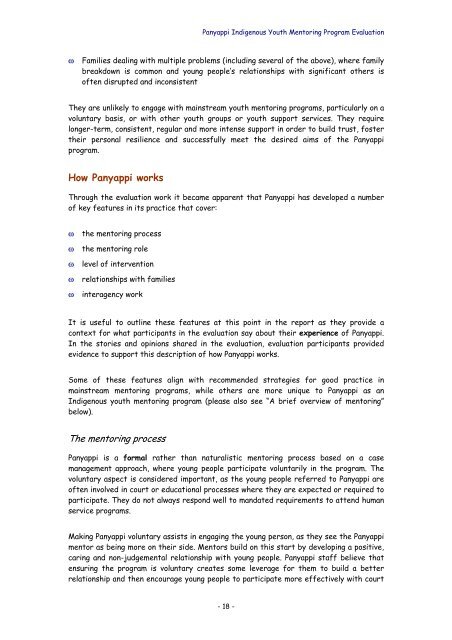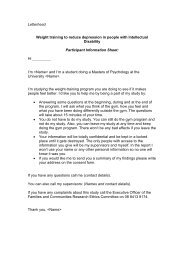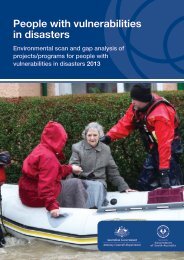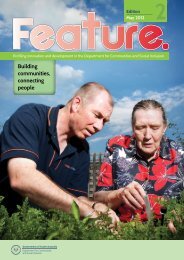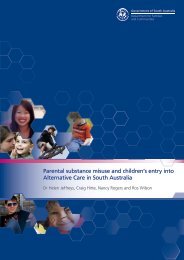Panyappi Indigenous Youth Mentoring Program Evaluation
Panyappi Indigenous Youth Mentoring Program Evaluation
Panyappi Indigenous Youth Mentoring Program Evaluation
Create successful ePaper yourself
Turn your PDF publications into a flip-book with our unique Google optimized e-Paper software.
ω<br />
ω<br />
ω<br />
ω<br />
ω<br />
ω<br />
<strong>Panyappi</strong> <strong>Indigenous</strong> <strong>Youth</strong> <strong>Mentoring</strong> <strong>Program</strong> <strong>Evaluation</strong><br />
Families dealing with multiple problems (including several of the above), where family<br />
breakdown is common and young people’s relationships with significant others is<br />
often disrupted and inconsistent<br />
They are unlikely to engage with mainstream youth mentoring programs, particularly on a<br />
voluntary basis, or with other youth groups or youth support services. They require<br />
longer-term, consistent, regular and more intense support in order to build trust, foster<br />
their personal resilience and successfully meet the desired aims of the <strong>Panyappi</strong><br />
program.<br />
How <strong>Panyappi</strong> works<br />
Through the evaluation work it became apparent that <strong>Panyappi</strong> has developed a number<br />
of key features in its practice that cover:<br />
the mentoring process<br />
the mentoring role<br />
level of intervention<br />
relationships with families<br />
interagency work<br />
It is useful to outline these features at this point in the report as they provide a<br />
context for what participants in the evaluation say about their experience of <strong>Panyappi</strong>.<br />
In the stories and opinions shared in the evaluation, evaluation participants provided<br />
evidence to support this description of how <strong>Panyappi</strong> works.<br />
Some of these features align with recommended strategies for good practice in<br />
mainstream mentoring programs, while others are more unique to <strong>Panyappi</strong> as an<br />
<strong>Indigenous</strong> youth mentoring program (please also see “A brief overview of mentoring”<br />
below).<br />
The mentoring process<br />
<strong>Panyappi</strong> is a formal rather than naturalistic mentoring process based on a case<br />
management approach, where young people participate voluntarily in the program. The<br />
voluntary aspect is considered important, as the young people referred to <strong>Panyappi</strong> are<br />
often involved in court or educational processes where they are expected or required to<br />
participate. They do not always respond well to mandated requirements to attend human<br />
service programs.<br />
Making <strong>Panyappi</strong> voluntary assists in engaging the young person, as they see the <strong>Panyappi</strong><br />
mentor as being more on their side. Mentors build on this start by developing a positive,<br />
caring and non-judgemental relationship with young people. <strong>Panyappi</strong> staff believe that<br />
ensuring the program is voluntary creates some leverage for them to build a better<br />
relationship and then encourage young people to participate more effectively with court<br />
- 18 -


